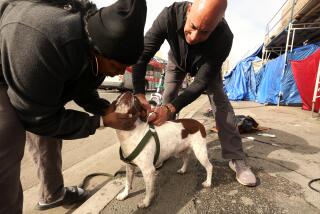More Sailors Reportedly Refusing Anthrax Vaccine
- Share via
WASHINGTON — A growing number of U.S. sailors in the Persian Gulf are refusing to be vaccinated against the deadly biological agent anthrax out of concern about possible side effects and long-term health risks, according to family members and their advocates.
The Pentagon last year announced that it would require, over a six-year period, that every member of the armed forces--1.4 million active-duty personnel and 1 million reservists--be vaccinated against anthrax. Troops in the Gulf are receiving the first vaccinations because Iraq is thought to have stockpiled enough anthrax for germ warfare.
Pentagon officials insist they are not concerned that some personnel are balking at the vaccine, because those resisting are few. Still, Pentagon efforts are underway to have senior officers and medical personnel counsel enlistees.
The Navy has disciplined 14 sailors on two carriers, the John C. Stennis and the Independence, officials said, for rejecting the first of six vaccination shots ordered by the Pentagon.
A second round of shots was to begin Friday on the Independence, and at least five other sailors are refusing, said Lori Greenleaf of Morrison, Colo. Among them is her son Erik T. Julius, a 22-year-old aviation boatswain’s mate third class, who Greenleaf said had heard rumors about ill effects from the vaccine.
Mark S. Zaid, a lawyer for 11 Independence sailors, said the protest was expanding to another ship, the USS O’Brien.
While experts say there are no known serious risks from the vaccine, in some cases it does produce headaches or other minor ailments. But Zaid and others say there has been little detailed study of the vaccine, which some suspect may be linked to Gulf War Syndrome, the mysterious illnesses reported by some who served in the Persian Gulf War.
In addition to the 14 sailors who refused the vaccine, two Air Force enlistees have refused to take the shots and are being disciplined. No Army or Marine Corps personnel are known to have declined the vaccine, said Col. Richard Bridges, a Pentagon spokesman.
“There’s nothing to fear from this particular vaccine,” Bridges said, noting that it has been in use since the 1970s. “It’s fully licensed and approved by the FDA.”
Bridges said that 31,478 of the estimated 36,000 troops in the Gulf have received the first vaccine and that 21,371 have received the second of six vaccines, which are given over an 18-month period. A yearly booster shot is also required.
A Pentagon study last fall reported that Iraq had produced 8,500 liters of anthrax and developed weapons capable of delivering it. U.S. Defense Secretary William S. Cohen warned last year that a dose of anthrax equal to the amount in a 5-pound bag of sugar could kill half the population of the District of Columbia.
Researchers at Ft. Detrick, Md., completed a long-term study in 1974 of 77 lab workers who took multiple immunizations, including the anthrax vaccine, and found no adverse effects.
In addition, Dr. Philip S. Brachman, a former epidemiologist for the Centers for Disease Control and Prevention and now a professor at Emory University, conducted the first review of the anthrax vaccine on millworkers in the late 1950s and found little cause for concern.
Chuck Dasey, a spokesman for Ft. Detrick, where the Army helped develop the anthrax vaccine, said 150,000 of the 500,000 personnel who served in the Gulf War had been vaccinated. But two independent studies discounted any link between the shots and Gulf War Syndrome.
More to Read
Sign up for Essential California
The most important California stories and recommendations in your inbox every morning.
You may occasionally receive promotional content from the Los Angeles Times.










